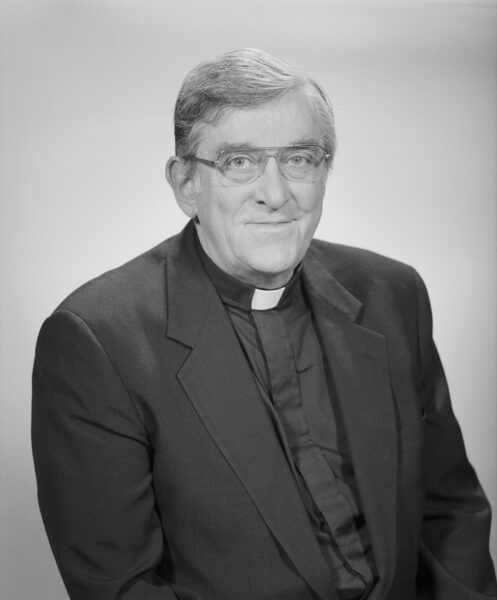
Marvin R. O’Connell. Notre Dame Archives
The Reverend Marvin R. O’Connell, professor emeritus of history at the University of Notre Dame, died on August 19, 2016, at age 86.
Father O’Connell was a native of St. Paul, Minnesota, received his theological education there, and was ordained a priest of the archdiocese of St. Paul-Minneapolis in 1956. His interest in history was encouraged while in the seminary by Patrick H. Ahern, the biographer of Bishop John J. Keane. O’Connell’s master’s thesis, which dealt with the history of the archdiocese in the 1920s, was published locally in 1955.
Father Ahern also played a role in O’Connell’s coming to Notre Dame in 1956 on a one-time fellowship named in honor of the English priest-historian John Lingard. Here his deeply revered mentor was Philip Hughes, another distinguished English priest-historian, whose three-volume history of the Reformation in England had been published only a few years earlier. After completing class work for the doctorate in 1958, O’Connell returned to St. Paul to teach at the College (now University) of St. Thomas. His PhD dissertation, approved in 1959, was published five years later by Yale University Press as Thomas Stapleton and the Counter Reformation.
In addition to guiding O’Connell’s studies in the early modern period, Hughes nurtured the young priest’s interest in Cardinal Newman and the Oxford Movement—an interest that resulted in O’Connell’s second book, The Oxford Conspirators: A History of the Oxford Movement, 1833–1845 (1969). This record of productive scholarship persuaded William L. Langer, the general editor of Harper & Row’s Rise of Modern Europe Series, to entrust to O’Connell the completion of the volume on Europe in the age of the Counter Reformation, a project begun by Hughes but left unfinished at his death in 1967. The completed work—The Counter Reformation, 1559–1610 (1974)—amply justified Langer’s confidence in its author, whose “depth of understanding and truly unusual objectivity” he praised in the volume’s introduction.
Although most of the research and writing for his contribution to the Langer series was done while Father O’Connell was teaching full time at the College of St. Thomas, he had joined the history faculty at Notre Dame two years before it was published. Here his teaching responsibilities were less demanding than at St. Thomas. O’Connell also took on, and discharged with distinction, the duties of chair of the history department between 1974 and 1980. Later in his career (1993–95), he served as director-in-residence of Notre Dame’s undergraduate program in London. He retired from teaching in 1995. After completingThe Counter Reformation, O’Connell tried his hand at a novel: McElroy (1980), a book tracing a young Minnesotan’s career in public life—a story perhaps inspired by, but not closely reflecting, the life of Eugene McCarthy. Next came John Ireland and the American Catholic Church (1988), a penetrating analysis of the career of the leading figure in the so-called Americanist controversy of the 1880s and 1890s.
Critics on Trial: An Introduction to the Catholic Modernist Crisis (1994), which received the American Catholic Historical Association’s John Gilmary Shea Prize in 1995, might seem to be a follow-up to O’Connell’s work on Archbishop Ireland and the “Americanist” movement within the Catholic church. It was, to be sure, his next major scholarly publication, and Americanism has been portrayed as a prelude of “Modernism.” But the author himself associated the Modernist book with his earlier study of the Oxford Movement, not Americanism. Both The Oxford Conspirators and Critics on Trial clarified the development of a complex religious movement through a chronological narrative stressing the interactions among, as well as the thinking of, the personalities involved in the story.
O’Connell’s next two books—Blaise Pascal: Reasons of the Heart (1997) and Edward Sorin (2001)—testify to his mastery of biography as a genre. Though quite unlike in temperament and life circumstance, Pascal, the semi-mystical explorer of religious sensibility, and Sorin, the bluff missionary and founder of the University of Notre Dame, are captured and portrayed with equal insight and artistry.
O’Connell revisited his home territory withPilgrims to the Northland (2009), a history of the archdiocese of St. Paul from its French missionary beginnings to the eve of the Second Council of the Vatican in 1962.
This listing of O’Connell’s major historical works reflects his remarkable range and versatility, qualities recognized in his lifetime achievement award from the American Catholic Historical Association in 2013. The same is true of his two-score articles, contributions to reference works, and collections of essays. For several years in the 1960s and early 1970s, he also produced short topical pieces syndicated in more than two dozen diocesan weeklies; in 1974, he won the National Catholic Press Association’s Columnist of the Year honor.
All of O’Connell’s writings are marked by a stylistic fluency that brings to mind what Newman called Cicero’s “copious, majestic, musical flow of language.” His passing is a loss to our profession, but he leaves behind a body of work through which (borrowing from Newman once again) “the secrets of the heart are brought to light . . . experience recorded, and wisdom perpetuated.”
Philip Gleason
University of Notre Dame (emeritus)
This work is licensed under a Creative Commons Attribution-NonCommercial-NoDerivatives 4.0 International License. Attribution must provide author name, article title, Perspectives on History, date of publication, and a link to this page. This license applies only to the article, not to text or images used here by permission.